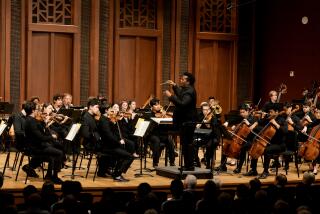Composer Asks Much of Artists, Students, Himself
- Share via
LA JOLLA — Composer Bryan Ferneyhough’s opinions are as uncompromising as the astringent idiom of his compositions. The expatriate British musician, who joined UC San Diego’s music faculty last fall, has few good words to say about that country’s music establishment, even though the London-based Arditti Quartet will perform one of his works this evening at UCSD’s Mandeville Auditorium.
“They were still back in the Celtic twilight,” Ferneyhough said in describing his peers and would-be mentors during his collegiate studies. “The academics and composers such as Peter Maxwell Davies were basically still back in the Middle Ages, trying to recapture a British character of music which had died out around 1650. Not having been a church choirboy, (this concern) was not germane to what I was pursuing.”
Like other postwar British composers, Ferneyhough chose to leave England and pursue his studies on the Continent. Although he considers himself to be essentially self-taught, he does admit to a pair of productive years in the master classes of Swiss composer Klaus Huber at the Basel Conservatory.
For the 14 years before coming to UCSD, Ferneyhough taught composition students in Freiburg, West Germany. Compared to contemporary music making in European conservatories and universities, the American higher education is fragmented and isolated, he said.
“The American university system is like the 14th-Century European city-state system. Each university develops its own particular aesthetic and approach toward music and teaching. Like the city of Florence in the Renaissance, each has its own insular court.”
He proposed that the parameters for instructing budding composers are indeed limited.
“Self-reliance and self-criticism are the essential things,” he said. “You can give them information, too, and teach them a few tricks you’ve learned along the way, if you like. When it comes to criticism, however, you must be both merciless and constructive.”
If Ferneyhough does not make things easy for his students, he is equally hard on the performers who would realize his works. When he wrote his Third Quartet for British violinist Irvine Arditti and his string quartet, he gladly took up Arditti’s challenge to write something more challenging than his Second Quartet, which the ensemble had premiered in 1980.
“I was determined to do something that was more difficult, but not in a technical or virtuostic sense, so the first movement is very slow and tense,” he explained.
He designed the first movement as a drawn-out, microtonal texture that would test Arditti’s powers of concentration since, in Ferneyhough’s words, “Arditti can play anything fast or violent at sight.”
The Third Quartet was premiered in Paris in October, although Arditti earlier had played a portion of the two-movement work for a British television documentary. Ferneyhough was pleased with his quartet’s inaugural reception, although he noted that his style is not currently fashionable in Europe.
“Arditti and I happen to like complex thought patterns and rapid rates of information transmission, even though this is out of favor. Most music in Europe today is Romantically colored or is some kind of motoric minimalism, which is something I’m totally against in my own work.”
In addition to the Third Quartet, Arditti will perform Gyorgy Ligeti’s Second String Quartet, Iannis Xenakis’ “Tetras,” and Roger Reynolds’ “Coconino . . . a Shattered Landscape.” Reynolds, who is a senior member of the UCSD music faculty, also dedicated his composition to the Arditti Quartet.
More to Read
The biggest entertainment stories
Get our big stories about Hollywood, film, television, music, arts, culture and more right in your inbox as soon as they publish.
You may occasionally receive promotional content from the Los Angeles Times.









